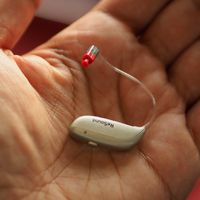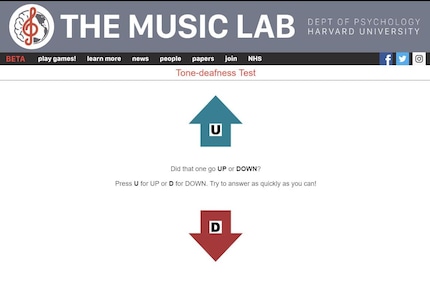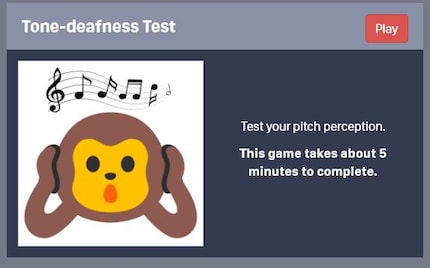
Background information
ReSound Vivia: The smallest AI hearing aid in the world
by Luca Fontana


The Music Lab is an online hearing test from Harvard University. In about five minutes, you can find out whether you have a good ear for music or whether you can only categorise sounds poorly.
At this link you will find the Music Lab with the test from Harvard's Department of Psychology. It's best to take the test with headphones, but it also works without them. The mobile version also worked for me, but according to the Harvard researchers, it is not yet finalised.
You can take the test anonymously. Firstly, the website asks you whether you think you are unmusical. Then you have to enter your gender, age, country of origin and language of origin. The site then asks you to take two or three volume tests. Finally, the site asks you whether you have a hearing impairment.
After all this, the test starts and you click through 32 different tones, where you have to distinguish whether it is higher or lower than the ones you heard before. Not only is it taken into account whether you have heard correctly, your time is also measured and included in the result.

After the test, the site wants to know what level of education you have and whether you have taken the test before. After that, the site wants some more information about your musical past. Then it spits out your result. You can see how you compare to other test subjects in percentage terms and how many of the 32 notes you have guessed correctly.
The researchers promise that participation in the study will be anonymous and that the data will be stored securely on a password-protected server at Harvard. This means that no one will know if you do disastrously well in the test ;)
The researchers want to use the test to find out how our minds work. They are investigating how we make sense of the music we hear. Your data can therefore be viewed by the researchers and will then be made available to the public as an overall result.
The general term "musical hearing" actually refers to absolute and relative hearing. People who have absolute hearing can precisely determine the pitch of any sound. Unlike when you are tested, they do not need to hear a reference tone. For example, if you press a key on the piano, a person with absolute pitch can tell you the name of the note. Very few people are blessed with absolute pitch. According to Wikipedia, only one in a thousand people has absolute pitch.

What is tested in the Music Lab is relative hearing. In relative pitch perception, sounds are identified using a reference tone. Only a very small part of relative hearing is tested in the online test. This is because relative hearing is made up of significantly more abilities than just being able to distinguish whether the sound heard is higher or lower. It must also be possible to determine the distance - for example in octaves and the distance of the pitch A. This is not tested in the test. This is not tested. What is tested is the so-called pitch perception. You can find another, somewhat more difficult test, for example here.
The Harvard test can be carried out without any major hurdles and still gives you an assessment of your musical hearing. Why don't you post in the comments how you did in the test
.


Testing devices and gadgets is my thing. Some experiments lead to interesting insights, others to demolished phones. I’m hooked on series and can’t imagine life without Netflix. In summer, you’ll find me soaking up the sun by the lake or at a music festival.
Interesting facts about products, behind-the-scenes looks at manufacturers and deep-dives on interesting people.
Show all